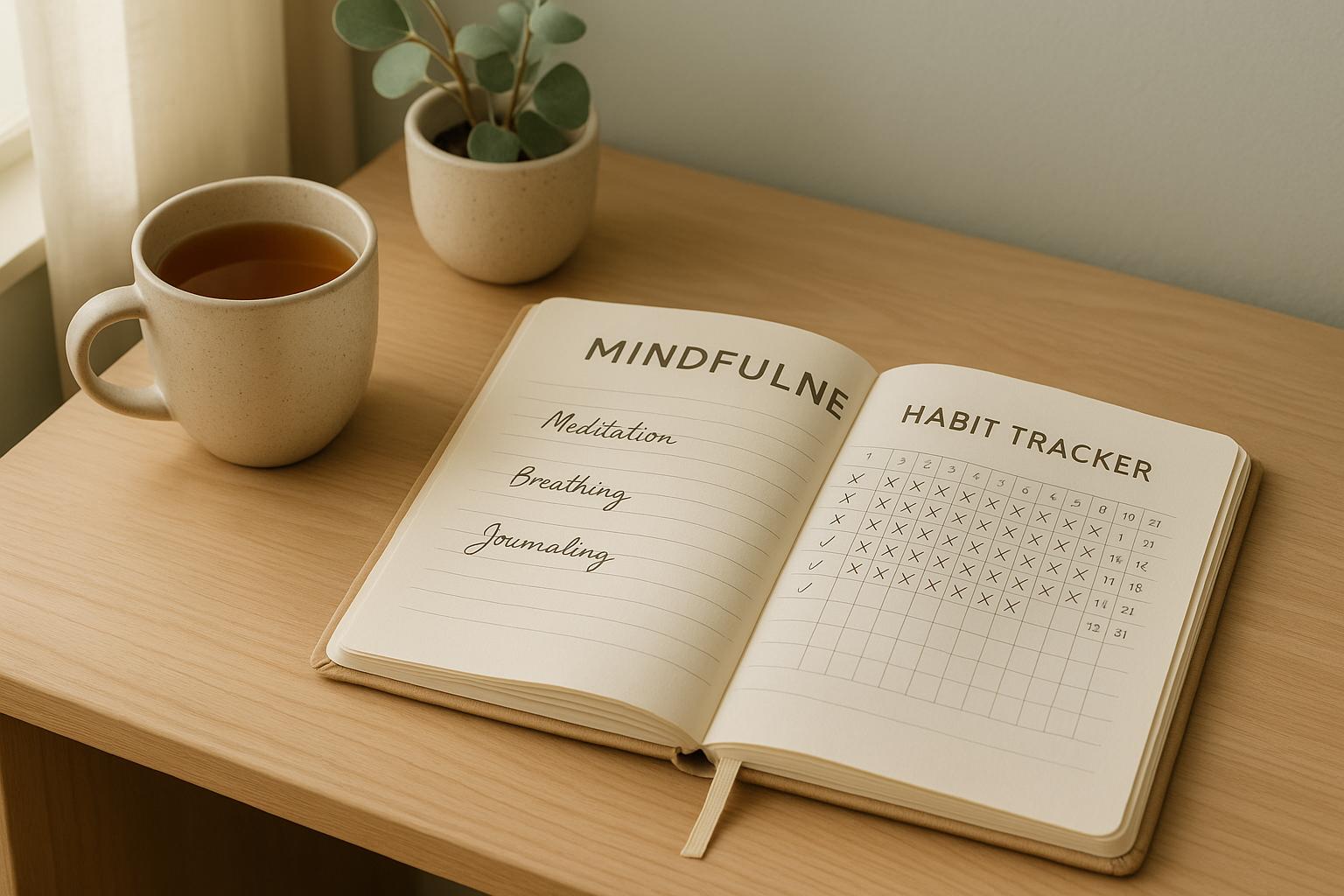Mindfulness is more than just a relaxation technique - it’s a practice that literally reshapes your brain to improve focus, emotional control, and self-discipline. Neuroscience shows that consistent mindfulness strengthens areas like the prefrontal cortex (responsible for decision-making) and calms the amygdala (your stress response center). This makes it easier to pause before reacting, resist temptations, and stay aligned with long-term goals.
Key Takeaways:
- Mindfulness strengthens self-control: It enhances brain regions tied to focus, impulse control, and emotional regulation.
- Stress management improves: By calming the amygdala, mindfulness reduces impulsive reactions and clears your mind.
- Practical results in weeks: Just 10–15 minutes a day can enhance focus, reduce distractions, and improve decision-making.
Simple daily practices like mindful breathing, body scans, or mindful eating can help you build discipline. Tools like The Mindfulness App offer guided meditations to make starting easy. Over time, mindfulness rewires your brain, helping you stay focused, manage stress, and make better choices.
The Neuroscience of Mindfulness - What exactly happens to your brain when you meditate.
Brain Changes from Mindfulness: What Science Shows
Advancements in imaging studies have provided a clearer picture of how mindfulness reshapes the brain. These studies reveal that mindfulness practice impacts regions responsible for attention, emotional regulation, and decision-making - key areas tied to self-discipline. Let’s dive into the specific neural changes uncovered through this research.
Reshaping Brain Structure and Flexibility
The brain’s ability to adapt, known as neuroplasticity, plays a central role in how mindfulness training rewires neural pathways. Studies indicate that mindfulness practice influences the anterior cingulate cortex (ACC), a region critical for maintaining attention. These structural changes improve focus, heighten awareness of internal cues, and lay a stronger neural groundwork for making thoughtful decisions.
Soothing the Stress Response System
Mindfulness doesn’t just change how the brain is structured - it also transforms how it reacts to stress. Research highlights reduced activity in the amygdala, the brain’s stress response center, paired with improved connectivity to the prefrontal cortex. This shift helps regulate emotional reactions and manage stress, fostering the mental clarity necessary for making disciplined choices.
Strengthening Brain Network Communication
Mindfulness also improves how different brain networks interact. For instance, the default mode network (DMN), which activates during mind-wandering, becomes more regulated with mindfulness training. This helps individuals notice when their thoughts stray and refocus on the present. Additionally, stronger links between the prefrontal cortex and other brain regions enhance self-control, aligning actions with long-term goals and reinforcing self-discipline.
In short, mindfulness leads to observable changes in the brain that support better focus, emotional balance, and disciplined behavior. The science is clear: mindfulness is not just a mental exercise - it’s a transformative practice that reshapes the brain.
Mental and Emotional Benefits for Self-Discipline
Studies using brain imaging reveal that mindfulness practice leads to structural changes in the brain, which play a key role in improving mental and emotional regulation. These changes directly enhance abilities like focus and decision-making, both of which are essential for self-discipline.
Better Focus and Memory
Mindfulness training has been shown to boost two critical cognitive skills: sustained attention and working memory. These improvements make it easier to stay focused on tasks and resist distractions that could derail progress.
The ability to maintain focus is particularly valuable when tackling challenging tasks, sticking to a fitness routine, or following a new diet. Mindfulness enhances this focus by reducing the tendency to get sidetracked by external distractions or internal mental noise. This sustained attention helps you stay on track and see tasks through to completion.
Working memory also plays a vital role in self-discipline. It allows you to hold and process information while making decisions, helping you keep your long-term goals in mind when faced with short-term temptations. For instance, if you're tempted to skip a workout, a stronger working memory can remind you of the benefits of exercise and how good you felt after your last session.
These cognitive improvements also help combat decision fatigue - the mental exhaustion that comes from making too many choices. With better focus and memory, your brain uses less energy throughout the day, leaving you with more willpower when you need it most. This mental clarity is a cornerstone of disciplined, goal-oriented behavior.
Less Negative Thinking and Better Mood
Mindfulness practice is highly effective at reducing rumination, the habit of dwelling on negative thoughts. Breaking free from these repetitive thought patterns is essential for maintaining the positive mindset needed to pursue challenging goals and recover from setbacks.
When people get stuck in cycles of negative thinking, they often lose motivation and abandon their disciplined efforts. Mindfulness helps by teaching individuals to observe their thoughts without being consumed by them, breaking the cycle of self-defeating negativity.
Improved mood is another key benefit of mindfulness. A more stable emotional state provides the foundation needed for disciplined behavior. When you're not constantly battling negative emotions, you have more mental energy to dedicate to your goals. Emotional stability makes it easier to make thoughtful, rational decisions rather than impulsive ones driven by fleeting feelings.
Mindfulness also encourages the development of a compassionate inner voice. Instead of harshly criticizing yourself for slip-ups, you learn to respond with kindness while still holding yourself accountable. This balanced approach prevents the shame and guilt that can derail long-term efforts to change behavior. With better emotional regulation, it's easier to stay consistent and committed.
Greater Self-Awareness and Emotional Control
One of the most impactful benefits of mindfulness is the development of metacognition - the ability to observe your own thoughts, feelings, and impulses as they arise. This heightened self-awareness creates a crucial pause between experiencing an impulse and acting on it.
Mindfulness helps you identify personal patterns and triggers that undermine discipline. By recognizing these patterns, you can develop strategies to manage them more effectively.
It also significantly improves emotional regulation. Instead of being overwhelmed by emotions like frustration, anxiety, or boredom, mindfulness teaches you to experience these feelings without immediately reacting. This ability to stay calm and composed is essential for maintaining discipline, especially during tough moments.
Self-awareness also fosters decision-making that aligns with your core values. When you're more attuned to what truly matters to you, it's easier to make choices that support your long-term goals, even if they require short-term sacrifices.
Together, self-awareness and emotional control enable what researchers call an adaptive response - the ability to choose your actions thoughtfully rather than reacting automatically. This skill is at the heart of self-discipline, allowing you to stay aligned with your goals even when faced with distractions or temptations.
sbb-itb-bea8dce
Research Evidence: Studies on Mindfulness and Discipline
Recent neuroscience research sheds light on how mindfulness training strengthens the brain's ability to support self-discipline and decision-making. Studies using neuroimaging and behavioral methods reveal that mindfulness boosts attention, emotional regulation, and self-control.
Major Studies and Training Programs
One of the most well-known programs, Mindfulness-Based Stress Reduction (MBSR), developed by Jon Kabat-Zinn, combines meditation, body awareness, and gentle yoga to teach mindfulness techniques. This program has been extensively studied and shown to help individuals build mindfulness skills. Other methods, such as Integrative Body-Mind Training (IBMT) and mindful attention exercises, have also been investigated. Research involving diverse groups suggests that these programs can improve focus and emotional balance, regardless of whether participants have prior meditation experience.
Brain Imaging Results
Brain imaging studies provide hard evidence of how mindfulness impacts the brain. These studies highlight changes in areas responsible for executive functions, emotional control, and stress management. Researchers have observed measurable improvements in neural connections and activation patterns after mindfulness training.
Interestingly, comparative studies show that even short-term mindfulness practices can lead to noticeable improvements in focus and emotional regulation. However, longer-term practices tend to deliver even greater benefits. Across the board, the evidence points to mindfulness as a powerful tool for enhancing brain functions tied to self-discipline.
Daily Practice: Building Discipline with Mindfulness
Daily mindfulness practice is a powerful way to strengthen self-discipline. Over time, consistent practice reshapes neural pathways in the brain, enhancing self-control and focus. Here’s how you can incorporate mindfulness into your daily routine to build discipline.
Simple Daily Mindfulness Exercises
Mindful breathing is a great starting point. Spend 5–10 minutes focusing on your breath. When distractions arise, gently guide your attention back. This exercise trains the prefrontal cortex, improving your ability to refocus and maintain self-discipline in everyday tasks.
Body scan meditation encourages awareness of physical sensations and emotions. Starting at your head, gradually shift your attention through your body, noting areas of tension or relaxation. This practice sharpens self-awareness, which is essential for making intentional, disciplined decisions.
Mindful eating transforms meals into moments of focus. Eat slowly, paying attention to each bite - the flavors, textures, and your hunger levels. This helps train your brain to pause before acting impulsively, a skill that carries over into other areas of life.
Three-minute breathing space is a quick way to reset during the day. Take three minutes to focus on your breath, center yourself, and expand your awareness. This brief practice activates the brain’s executive functions, helping you make more deliberate choices.
How The Mindfulness App Supports Your Goals

Digital tools can make mindfulness practice more accessible and structured. The Mindfulness App is one such resource, offering guided meditations tailored to specific goals like managing stress, improving focus, or sticking to healthy habits.
The app features over 500 guided meditations to help you target areas where you want to build discipline. Whether it’s resisting stress eating, staying productive at work, or maintaining a fitness routine, there’s a meditation for you.
Its mindfulness courses provide step-by-step training, similar to research-backed programs like Mindfulness-Based Stress Reduction (MBSR). These courses start with foundational awareness practices and progress toward techniques for managing emotions and impulses.
Sleep stories are another feature that reinforces discipline. Quality sleep is crucial for maintaining self-control, as poor sleep weakens the brain’s ability to regulate impulses. Listening to these stories can improve your rest, setting you up for a more disciplined day.
With offline functionality, you can continue your practice anywhere, ensuring consistency no matter where you are.
Building a Regular Mindfulness Habit
Start small - 10–15 minutes of daily practice at the same time each day can help you build a consistent routine. Many people find that practicing in the morning sets a focused, disciplined tone for the rest of the day.
Track your progress to stay motivated. Over time, you’ll notice improvements in your focus and ability to stay present during meditation. These gains translate directly into better self-control in other areas of your life.
Align your practice with your goals. If emotional eating is a challenge, focus on body awareness meditations. If procrastination holds you back, prioritize attention-training exercises to boost focus.
Use reminders, like app notifications or visual prompts, to make mindfulness a natural part of your day. The goal is to make it as routine as brushing your teeth.
With consistent practice, you can expect noticeable improvements in 2–4 weeks, and deeper, lasting changes after 8–12 weeks.
Conclusion: How Mindfulness Changes Your Brain and Life
Key Insights on Mindfulness and Brain Function
Mindfulness doesn't just help you feel calmer - it actively reshapes your brain. By boosting gray matter in the prefrontal cortex, reducing the amygdala's overactivity, and quieting the default mode network, mindfulness enhances your ability to focus, regulate emotions, and make thoughtful decisions.
These changes lead to a more balanced brain, one that can pause before reacting, weigh options clearly, and stick to long-term goals despite short-term distractions. In practical terms, this means sharper concentration at work, better emotional control in stressful moments, and greater resistance to unhealthy habits.
Interestingly, the most noticeable brain changes occur after 8-12 weeks of consistent mindfulness practice. This shows that mindfulness isn't about sheer willpower - it’s about rewiring your brain to make self-discipline feel more natural and effortless. These neurological shifts provide a scientific explanation for how mindfulness fosters real, everyday discipline.
Incorporating Mindfulness Into Your Routine
You don’t need hours of meditation to benefit from mindfulness. Just 10-15 minutes a day can strengthen the brain circuits responsible for self-discipline. The trick is to focus on consistency rather than duration.
Start small with simple practices like mindful breathing or body scans. Over time, as these exercises become second nature, you can expand to include mindfulness in everyday activities like eating, walking, or even working. Each moment of mindful awareness helps reinforce the neural pathways that support self-control.
For those looking for guidance, tools like The Mindfulness App offer over 500 guided meditations and structured courses to help you build a sustainable mindfulness habit.
The science is clear: mindfulness is a proven way to reshape your brain for a more disciplined and focused life. With regular practice and the right resources, you can tap into your brain’s natural ability to adapt and grow, creating lasting improvements in self-control that extend far beyond your meditation sessions.
FAQs
How long does it take for mindfulness to improve your brain and behavior?
Consistently practicing mindfulness can bring about clear changes in both your brain and behavior in just a matter of weeks. Research shows that within 2–3 weeks of regular mindfulness practice, you might start noticing functional improvements - like feeling more at ease and better able to concentrate.
For more profound changes, such as an increase in gray matter in brain regions tied to memory and managing emotions, it usually takes around eight weeks of consistent effort. Programs like an eight-week mindfulness-based stress reduction (MBSR) course are designed to achieve these kinds of results. While the initial perks of mindfulness can show up quickly, achieving deeper, lasting changes often calls for several months of commitment.
What mindfulness techniques can help build self-discipline?
Mindfulness techniques, such as the 3-breath practice, can work wonders for strengthening self-discipline. This straightforward exercise involves pausing to take three slow, intentional breaths. It’s a quick and effective way to reset your focus, allowing you to respond with intention rather than acting on impulse.
Another helpful method is focused breathing, where you direct your attention to the sensation of your breath. This practice not only sharpens your focus but also enhances emotional control. Both techniques encourage your brain to pause between a trigger and your reaction, giving you the space to make more thoughtful, disciplined decisions.
How does mindfulness affect the brain areas responsible for managing stress and emotions?
Mindfulness practice has the power to reshape critical parts of the brain responsible for managing stress and regulating emotions. Specifically, it enhances the anterior cingulate cortex and lateral prefrontal cortices, two regions that play a key role in emotional awareness and self-control. With consistent practice, this can lead to greater emotional balance and improved decision-making.
On a deeper level, mindfulness also affects brain areas connected to memory and mood. By reducing stress reactivity, it encourages a more positive mindset, helping individuals respond to challenges in healthier ways and lowering anxiety over time.



.jpeg)


